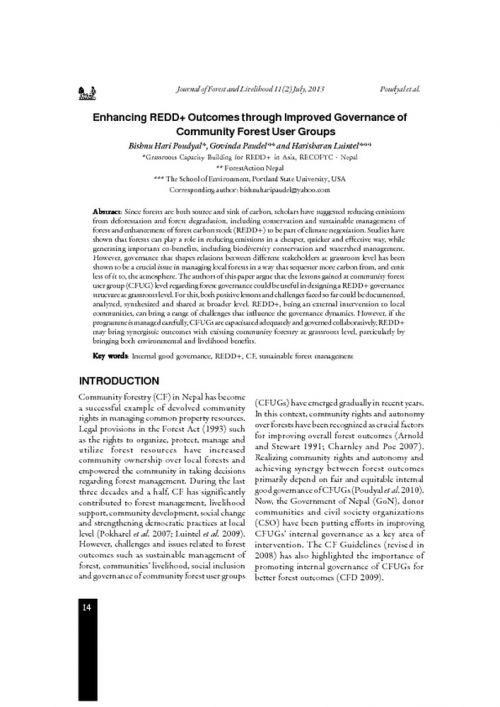APA 6th ed. Enhancing REDD+ Outcomes through Improved Governance of Community Forestry User Groups. (2013, July 1). Retrieved from https://www.recoftc.org/publications/0000283
MLA 8th ed. Enhancing REDD+ Outcomes through Improved Governance of Community Forestry User Groups. RECOFTC, 1 July 2013, https://www.recoftc.org/publications/0000283.
Chicago 17th ed. RECOFTC. 2013. "Enhancing REDD+ Outcomes through Improved Governance of Community Forestry User Groups." Published July 1, 2013. https://www.recoftc.org/publications/0000283.
Enhancing REDD+ Outcomes through Improved Governance of Community Forestry User Groups

Since forests are both source and sink of carbon, scholars have suggested reducing emissions from deforestation and forest degradation, including conservation and sustainable management of forest and enhancement of forest carbon stock (REDD+) to be part of climate negotiation. Studies have shown that forests can play a role in reducing emissions in a cheaper, quicker and effective way, while generating important co-benefits, including biodiversity conservation and watershed management. However, governance that shapes relations between different stakeholders at grassroots level has been shown to be a crucial issue in managing local forests in a way that sequester more carbon from, and emit less of it to, the atmosphere. The authors of this paper argue that the lessons gained at community forest user group (CFUG) level regarding forest governance could be useful in designing a REDD+ governance structure at grassroots level. For this, both positive lessons and challenges faced so far could be documented, analyzed, synthesized and shared at broader level. REDD+, being an external intervention to local communities, can bring a range of challenges that influence the governance dynamics. However, if the programme is managed carefully, CFUGs are capacitated adequately and governed collaboratively, REDD+ may bring synergistic outcomes with existing community forestry at grassroots level, particularly by bringing both environmental and livelihood benefits.

